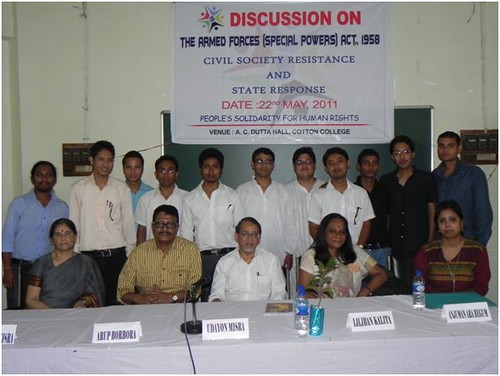By TCN Staff reporter, TwoCircles.net,
Guwahati: In response to the call of People’s Union for Civil Liberties (PUCL) for a nationwide protest demanding repeal of Armed Forces Special Powers Act, 1958 (AFSPA), Peoples Solidarity for Human Rights (PSHR), a Guwahati based organisation, organised a discussion on AFSPA 1958 –civil society resistance and state response on May 22 in Cotton College. The programme was in support of Irom Sharmila who is on hunger strike for last ten years demanding the repeal of the Act and to commemorate 53 year of the enforcement of AFSPA in north eastern states.

Various aspects of the Act were discussed in the programme. Speaking on the occasion senior advocate Arup Borbora said that AFSPA, having its colonial legacy, has been responsible for gross violation of human rights. He mentioned that four categories of cases of violations are very common, namely torture, disappearances, fake encounters and failure of producing the detainees to the nearest police station. Borbora also pointed out that under TADA about 7000 peoples were arrested in the state and out of this number only few were actually found guilty and about 80% of these arrests were innocent youths.
Another speaker, Anjuman Ara Begum, research scholar of Guwahati university pointed out that on three occasions AFSPA came before the supreme for judicial review. In Sebastian Hongrey case of 1983 the Supreme Court awarded compensation for custodial disappearance but this exemplary compensation was as a result of contempt of court and not as a result of violation of right to life. Then again in 1997, the judgment of 1997 in Naga Peoples Movement for Human Rights vs. Union of India, the court upheld the validity and constitutionality of the Act. In 2007, the Supreme Court again reviewed the practical application of the Do’s and Don’ts guideline applicable to AFSPA. Due to prior sanction provision required for the prosecution of the armed forces, the Act has created a culture of impunity and as a result violations of human rights never meet justice.
Liliban Kalita, Lecturer of the J.B Law College spoke about the enforcement of common article 3 of the Geneva Convention and its violation under AFSPA. She pointed out that Geneva Convention specially article 3 prohibits killing of innocent civilians in non-international armed conflict but AFSPA under section 4(a) gives wide ranging powers to the armed forces to use force to the extent of causing death on mere suspicion.
Prof. Tilottoma Misra, eminent writer said in her speech that the case of Irom Sharmila shows that a Gandhian is no more respected in India and it has no relevance in today’s India. Prof Udayon Mishra presided over the meeting and stressed the need for generating more awareness about the Act to strengthen the movement for it repeal.

